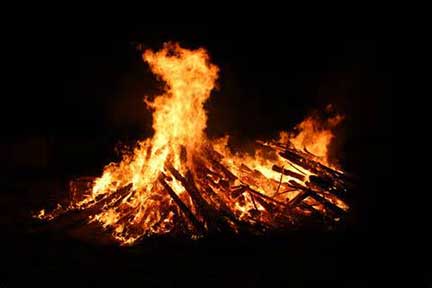 Happy Halloween
Happy Halloween
Good morning and Happy Halloween!
I don’t know if you saw the paper a week or so ago. Apparently, some people in the Bible Belt are unhappy about the fact that Halloween falls on Sunday this year. Some towns changed the celebration to Saturday to avoid complaints about witches and demons ringing people’s doorbells on the Sabbath. Of course, Sunday is not really the Sabbath. One woman said, “You just don’t do it on Sunday. That’s Christ’s day. You go to church on Sunday, you don’t go out and celebrate the devil. That’ll confuse a child.” Apparently, she doesn’t think it would be confusing on another day.
Halloween is a controversial holiday among Christians. But it’s not any more pagan than Christmas or Easter. When Christianity was declared the religion of the Roman Empire in the 300s, pagan holidays became Christian holidays. “Yule”, celebrating the winter solstice, became Christmas. “Ostara” or “Ishtar” celebrating spring and fertility, became Easter. Halloween became All Hallow’s Eve, the eve of All Saint’s Day.
Halloween was called Samhain (sow-un) by the pagans and was the Celtic New Year's Eve, the beginning of the cold winter months. Samhain means “end of summer.” It was the last harvest festival, the time when people needed to have everything harvested and ready for winter. All the animals were slaughtered except the ones kept for breeding. People would build a huge fire and throw the bones of the slaughtered animals on the bone-fire, or bonfire. Animals and sometimes humans might be sacrificed on these fires.
Halloween focuses on death. The ancient Celts believed that at this time, the veil between this world and the world of the dead was drawn aside, and journeys could be safely made back and forth. If you had wronged or angered anyone who was dead, they could come back to take revenge. Dead family members could return for a friendly visit.
People might wear costumes of animal heads and skins to scare away unwelcome spirits or to disguise their identity. Women would dress as men and men as women. Black cats were feared because it was believed that they were humans who had become cats because of their evil deeds. People feared that spirits would steal their children and leave changelings, look-alike goblins, in their place. The way to get your real child back was to mistreat the changeling until the goblins came back to rescue him. Children born on Halloween were supposed to be able to see and talk to spirits more easily than other children.
Early Americans wouldn’t even celebrate Christmas because of its pagan history, but by the time Irish immigrants arrived in America after the potato famine, most people had stopped believing in demons, spirits or witches. By the 1920s, Halloween was a popular holiday. It is now second only to Christmas as far as the amount of money spent. The custom of trick-or-treating began in America, though long ago beggars would go from home to home a-soulin’, asking for soul cakes in exchange for prayers for the dead. Pumpkins are also American. In Ireland, children carved turnips instead.
Winter was a time of fear before modern times. No one knew how cold the winter would be, how much it would snow, or who would die before spring. The Druids attempted to contact the spirits of the dead to ask questions about the future. October 31 was a time when fortune-telling was thought to have an excellent chance of success.
But isn’t this all superstition? Are there really witches and demons?
The Bible says there are. Demons are fallen angels. The word “demon(s)” shows up 66 times in the Bible, mostly in the New Testament. C.S. Lewis warns that we can make two errors concerning demons. One is not to believe in them. The other is to have an unhealthy interest in them. We are forbidden by God to engage in witchcraft or occult activities, or to seek contact with demons. God considers it an abomination, a great evil.
In 1 Samuel, Saul, the king of Israel, asked the LORD for advice before a battle but didn’t receive an answer. So he disguised himself and went to consult the witch of Endor. He asked her to summon Samuel from the grave. I’ll read starting at 1 Samuel 28:12:
When the woman saw Samuel, she cried out at the top of her voice and said to Saul, “Why have you deceived me? You are Saul!”
The king said to her, “Don’t be afraid. What do you see?”
The woman said, “I see a spirit coming up out of the ground.”
“What does he look like?” he asked.
“An old man wearing a robe is coming up,” she said.
Then Saul knew it was Samuel, and he bowed down and prostrated himself with his face to the ground.
Samuel said to Saul, “Why have you disturbed me by bringing me up?”
“I am in great distress,” Saul said. “The Philistines are fighting against me, and God has turned away from me. He no longer answers me, either by prophets or by dreams. So I have called on you to tell me what to do.”
Samuel said, “Why do you consult me, now that the LORD has turned away from you and become your enemy? The LORD has done what he predicted through me. The LORD has torn the kingdom out of your hands and given it to one of your neighbors — to David. Because you did not obey the LORD or carry out his fierce wrath against the Amalekites, the LORD has done this to you today. The LORD will hand over both Israel and you to the Philistines, and tomorrow you and your sons will be with me. The LORD will also hand over the army of Israel to the Philistines.”
It must really have been Samuel’s spirit. His prophecy was correct. Saul and his sons were all killed the very next day.
Paganism, or nature worship, is at the foundation of nearly all non-Bible religions. It started with the Babylonian mystery religion begun by Nimrod at Babel and spread through the world. The message of paganism is the exact lie the serpent used with Eve:
- Your eyes shall be opened.
- You shall know good and evil.
- You shall be like God.
- You shall not die.
Paganism would call the serpent in the garden the truth-teller and the God of the Bible the liar.
Since witchcraft laws were repealed, millions of people in America and around the world have embraced paganism, nature worship and sun worship. It is the same religion as ancient Canaanites practiced, compete with sacred groves. It is attractive. It offers great freedom. It assures people that the god or goddess lives inside them, and that they can open their eyes and tap into the forces of the universe, which are really good even if they appear evil. It teaches that we will not die but will be reincarnated or go to a better place.
If these things are true, God is a liar and the Bible cannot be trusted. Both God and Satan tell us the other is lying. We have to figure out Who is telling the truth and who is lying. Once we figure out Who is telling us the truth, we should follow and trust Him.
There is a lot of focus in America today on death. I see young people every day dressed and made up to look dead. They don’t wait until Halloween to wear costumes anymore. TV and movie producers are obsessed with death. Death sells. So do other ancient pagan practices like tattooing, piercing and drugs.
Halloween is a holiday about demons, sorcery, death and darkness. But God is light. In Him there is no darkness at all, no shifting shadows. Is it sinful to celebrate Halloween? We each have to settle that for ourselves.
Paganism is idol worship, the worship of created things rather than the Creator. 2 Corinthians 6:16 says:
What agreement is there between the temple of God and idols? For we are the temple of the living God.
The purpose of life on earth, according to the Bible, is to give us an opportunity to choose between life and death. Death is the default. If the Bible is true, which paganism would deny, we choose death unless we choose Jesus. By connecting to God, the source of all life, we leave eternal death behind us. It is a lie of the devil that there is something good or glamorous or exciting about death, demons, or the occult.
Song: "A'Soalin'", as sung by Peter, Paul and Mary.
Hey ho, nobody home, Meat nor drink nor money have I none. Yet shall I be merry. Hey ho, nobody home.
A'soal, a soal, a soal cake, Please good missus a soal cake,
An apple, a pear, a plum, a cherry, any good thing to make us all merry,
One for Peter, two for Paul, three for Him who made us all.God bless the master of this house and the mistress also, and all the little children that around your table grow.
The cattle in your stable, the dog by your front door, and all that dwell within your gates. We wish you ten times more.Go down into the cellar and see what you can find. If the barrels are not empty, we hope you will be kind.
We hope you will be kind with your apple and strawber', For we'll come no more a-soalin' til this time next year.The streets are very dirty, my shoes are very thin. I have a little pocket to put a penny in.
If you haven't got a penny, a ha-penny will do. If you haven't got a ha-penny, then God bless you.
Go on to read Spending Moral Capital
Source: www.SusanCAnthony.com, ©Susan C. Anthony
